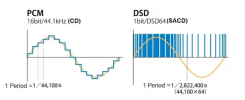Thanks for these measurements. I am painfully learning through Acourate .
I have the "lite" version, AcourateDRC, not much to learn there. Can set a curve (to some degree), set how "sharply" (for lack of a better word) it corrects - and not much else. But it is sufficient, and tailored specifically to the convolver I have, the MiniDSP OpenDRC-DI.
My measurement posts use REW - Room Equipment Wizard, and, in the case just above, an import of a music file into Audacity.



